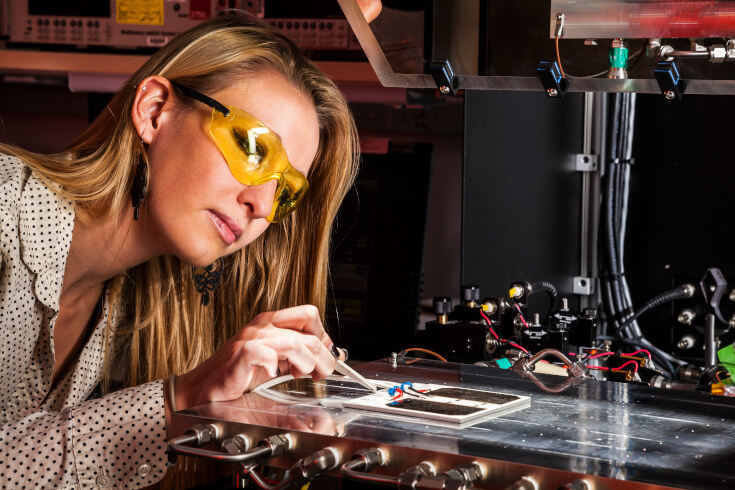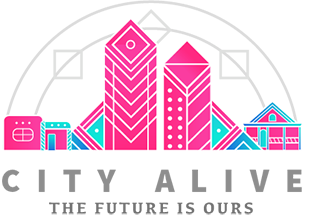Albuquerque Named Top 10 City for Women in Tech

Albuquerque has been named a top 10 best city for women in technology for two years in a row. According to the new study from SmartAsset, Albuquerque has one of the highest percentages of women in the tech workforce, and one of the lowest gender pay gaps.
For a second year running, Albuquerque has punched above its weight, beating out cities nationally known for leading the technology sector, such as San Francisco and Oakland. The study weighed four factors: the gender pay gap, income after housing, women as a percent of the tech workforce, and the percent change in tech jobs.
How We Compare
Albuquerque women in tech earn 95 percent of what their male counterparts make, ranking us seventh on the list for rising pay equity. Nationally, women only earn 84 percent of what men in tech do, according to Census Bureau data.
Women also make up nearly 30 percent of the tech workforce, the 10th best ranking in the country. Interestingly, while Albuquerque is on the rise, places like the Bay Area are losing their appeal. California cities such as San Francisco, San Jose, and Oakland all rank 28th or lower on the list. Where women in Albuquerque make up 30 percent of the workforce, and 95 percent of the salary of male colleagues, those in the Bay Area make up 22 percent of the workforce and earn 82 percent of the salary of male counterparts.
Albuquerque’s high ranking is due in part to the low cost of living and high concentration of national laboratories. But there’s more to the story.
Albuquerque’s Secret
What unique solutions are helping close the gap? For one, Albuquerque’s welcoming and accessible training opportunities across all ages are creating entry points. From Girls Who Code to bootcamps like Cultivating Coders and Deep Dive Coding, tech training programs are recruiting record numbers of women in Albuquerque.
Alongside training programs, institutions like UNM’s School of Engineering have made concerted efforts to attract and retain more women in their full time faculty. Additionally, the UNM Computer Science Department has one of the highest percentages of women faculty in any program in the country. Currently the department is 40 percent female, compared to 20 percent nationwide.
Paige Prescott, Executive Director of the Computer Science Alliance and Supercomputing Challenge, ties the increasing gender parity in higher education to progress made in public schools. The number of computer science classes offered in New Mexico middle and high schools has doubled since 2016, she said. As awareness has increased around the importance of computer literacy and IT skills for 21st century jobs, state policy has also evolved. However, Prescott warns, just because more classes are offered, doesn’t mean women are taking them. Her organization is partnering with the Nation Center for Women in Technology Information (NCWIT) to train public school counselors on identifying and preventing unconscious gender biases that discourage young women from STEM tracks.
Local Talent, Local Growth
Lisa J. Adkins, COO of The BioScience Center, FatPipe ABQ, and Ingenuity Software Labs, has been working in the technology sector for over 30 years. At one of her first IT jobs, she remembers, “I was hired at an IT company, but asked to answer phones. One weekend, a male colleague invited me in to help build some PCs. When the owner came in and saw me bent over a CPU with a screwdriver, he yelled, ‘Step away from that computer!’ The next Monday, he put me back behind the receptionist desk.” She laughs about it now, but says, “The landscape for women in tech has changed so much since I started. Changed so much for the better.”
Since then Adkins has built two software development companies, ran the NM Tech Council, developed Albuquerque's first Women in Tech peer group, and inaugurated the Women in Technology Celebration Awards.
“Over my career I’ve seen so many more women in tech, the rise of coding bootcamps and developer clubs for girls and women, and so many women pursue jobs with equal pay,” Adkins says. “The community of women in Albuquerque is helping each other, teaching each other, supporting each other. There’s a nurturing spirit.”
Take for example, Rubber Ducks NM, a grassroots initiative by and for women in tech. Started by Kimberly Keller in 2017, Rubber Ducks membership has grown from around 30 members in 2018 to over 100. The group provides free training, networking opportunities, and mentorship for women in technology fields.
Software developer and Rubber Ducks NM member Erin Scott Adams came to the group looking for allies. Scott Adams left her job in marketing and communications to pursue a second career as a developer, graduating from Deep Dive Coding in 2018. Hired by local software development company RS21, she started as the sole woman on the development team (and is now one of two). “Not only was it a completely new field for me, but to be the newest hire, one of the most junior, and the only woman, it was definitely challenging.”
The community of Rubber Ducks NM helped her build confidence and find her footing. “It’s a safe space to ask questions in real time, get guidance, and not feel intimidated. We needed a casual place to meet and talk about job opportunities, salaries, and cool projects.”
“Albuquerque is different. There is something special about the community here,” Scott Adams says. “Deep Dive Coding and Cultivating Coders are a big part of it, with their network of active alumni, meetups, and continuing educational opportunities. Plus there’s cross pollination and collaboration thanks to Coffee and Creatives, FatPipe, and NM Tech Council.” She believes Albuquerque is a top city for women in tech because of this unique support system. “Luckily I had a lot of people willing to mentor me,” Scott Adams says. “I really credit my success to the community here helping women get their foot in the door.”
Prescott, of the Computer Science Alliance, agrees. Community support systems like Rubber Ducks NM have a visceral effect. They help young women see themselves in tech careers, she says.
“Having women as role models is helpful in creating an ecosystem of equity where girls feel excited to participate. And being able to point to a ranking like this is a nice feedback loop,” Prescott says.





